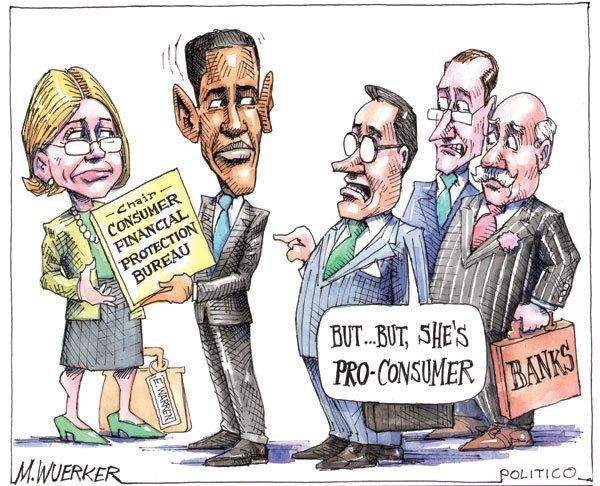“The game is
rigged.” To the student of US History,
the ring of this provocative statement should sound more than just vaguely
familiar. We should permit a digression before
returning to this theme.
Does the statement
sound more authoritative, echoing as it does from the US Senate floor of the
nation’s capitol? Its present day author
is US
Senator Elizabeth Warren (D-MA), progressive champion and Consumer
Financial Protection Bureau architect.
If one did not know better, one would think she’s itching for a fight. She wouldn’t be the first.
Sen. Warren,
populist advocate, laments that consumers, families and the poor have been
“chipped, squeezed and hammered."
At the 2012 Democratic National Convention she states that “Republicans
say they don't believe in government. Sure they do. They believe in government
to help themselves and their powerful friends.”
She continues: “After all, Mitt Romney’s the guy who said corporations
are people.” Republican Mitt Romney would reinforce that rigged system, she
said, while President Obama would continue his work to dismantle it. Warren
adds “No, Gov. Romney, corporations are not people. People have hearts, they have kids, they get
jobs, they get sick, they cry, they dance.
They live, they love, and they die. And that matters.”
Sen. Warren’s new book is called A Fighting Chance (Metropolitan Books,
2014). It spells out in detail how the
game is rigged. A typical passage
follows:
“Here’s what I see out of
this. Washington works --- for those who can hire
an army of lobbyists and lawyers. It
just doesn’t work so well for families.
I saw it with the big banks. They
cheated American families, crashed the economy, got bailed out, and now the
five biggest financial institutions in America are 38% bigger than they
were during the crash. They still
swagger through Washington
blocking reforms and pushing around agencies.
They break the law. And no banker
even faces the inconvenience of a trial, much less a little jail time. The game is rigged.”
In July 2014 Sen. Warren travels
to Detroit,
speaking out in support of her book’s ideas:
“Today, many powerful companies
look for every possible way they can to boost their profits and to boost their
CEO bonuses. They try to run more
efficient companies. They try to grow
faster. They try to beat out the
competition. But many of them have
another plan. They use their money and
their connections to try to capture Washington
and rig the rules in their favor. From
tax policy to retirement security, those with power fight to make sure that
every rule tilts in their favor.
Everyone else just gets left behind.
That’s what we’re up against.
That’s what democracy is up against.”
There’s an awful lot of substance
weaved in here. A former
Harvard professor, Sen. Warren is by all accounts an extremely intelligent woman. The War on Drugs swallows up the ideal if not
the cause of the War on Poverty --- and just beneath the surface there lies the
continued control and subjugation of the black race and people of color more
generally. And today, poverty is not
restricted to people of color --- many whites share the tattered cloak.
The catchphrase ‘The game is
rigged’ is, of course, bespoken of frustration.
But here’s the interesting part. Sen.
Warren knows that the game has been planned this way all along. The frustration dates back more than 200
years. It is Thomas Jefferson’s
frustration, as well.
The new constitution for the young country with the fledgling democracy does not endorse a particular economic
system. Secretary of Treasury Alexander Hamilton proposes the economic system of capitalism on the successful British
model. Secretary of State Thomas Jefferson objects. As
with most issues he faces down, President Washington is unable to fall back on
precedent.
Jefferson says that Hamilton’s system flows “from principles adverse to
liberty, and was calculated to undermine and demolish the republic.” It does this by creating an artificial
class of wealth with certain inherent privileges to certain of its benefactors,
which were not the privileges of all citizens.
These benefactors, not by coincidence, are the system’s creators and
protectors --- they are members of the US Congress. Hamilton’s
plan, a class system favoring money, would violate the unfettered freedom of
the individual to pursue happiness. It sounds as if Jefferson’s saying that the game is rigged.
Taking Jefferson's arguments into account, before ultimately rejecting them, President Washington’s fateful decision in favor of Hamilton’s plan envisions the greatest good for the greatest number. Its success by almost any reasonable measure is beyond question. And so, when Sen. Warren says ‘the game is rigged’ and this is what democracy is up against, isn’t she asking ordinary citizens to question the wisdom of George Washington?
On any legitimate
scorecard, it’s a mighty tall order.
-Michael D’Angelo

